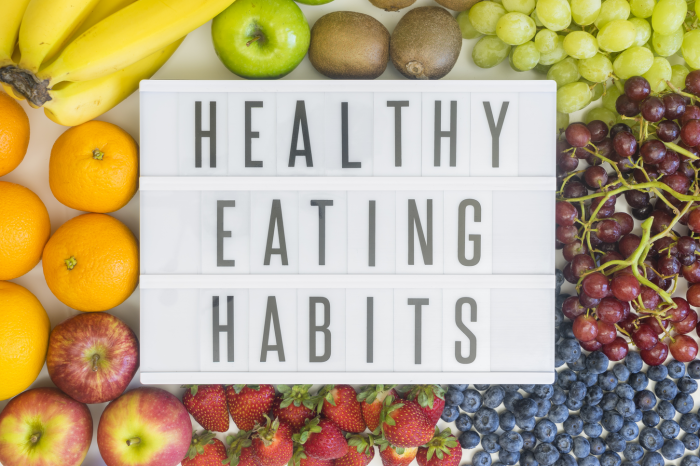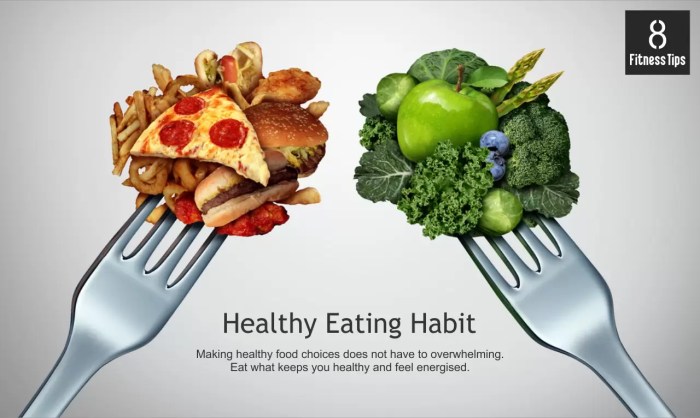Healthy Eating Habits are not just about what you eat, but how you nourish your body and mind. Dive into this flavorful journey towards a healthier lifestyle.
Let’s explore the key ingredients to a balanced diet and discover the secrets to maintaining a well-rounded approach to nutrition.
Benefits of Healthy Eating Habits
Eating healthy isn’t just about looking good, it’s about feeling good too. Here are some key benefits of maintaining healthy eating habits:
Impact on Physical Health
Maintaining a healthy diet filled with fruits, vegetables, whole grains, and lean proteins can significantly improve your physical health. By providing essential nutrients and vitamins, healthy eating habits can help prevent chronic diseases like heart disease, diabetes, and obesity.
Improves Mental Well-being
Believe it or not, what you eat can also impact your mental health. A balanced diet can help improve mood, reduce stress, and increase overall cognitive function. Foods rich in omega-3 fatty acids, like salmon and walnuts, can even help boost brain health.
Boosts Overall Energy Levels, Healthy Eating Habits
Ever feel sluggish or lethargic after a heavy meal? Eating a balanced diet can help regulate blood sugar levels and provide a steady source of energy throughout the day. By fueling your body with nutrient-dense foods, you can say goodbye to those mid-afternoon energy crashes.
Components of a Healthy Diet
Eating a balanced diet is crucial for maintaining good health and overall well-being. It involves incorporating a variety of essential food groups to ensure you are getting all the necessary nutrients your body needs to function properly.
Essential Food Groups for a Balanced Diet
- Fruits and Vegetables: These are rich in vitamins, minerals, and antioxidants that help boost your immune system and reduce the risk of chronic diseases.
- Carbohydrates: Carbs are the body’s main source of energy and should come from whole grains, fruits, and vegetables rather than processed foods.
- Proteins: Protein is essential for building and repairing tissues in the body. Good sources include lean meats, poultry, fish, beans, and nuts.
- Fats: Healthy fats like those found in avocados, nuts, and olive oil are important for brain function and hormone production.
The Importance of Incorporating Fruits and Vegetables
Fruits and vegetables are packed with essential vitamins, minerals, and fiber that are important for maintaining a healthy weight and reducing the risk of chronic diseases such as heart disease, diabetes, and certain types of cancer. Aim to fill half your plate with fruits and vegetables at each meal to ensure you are getting a wide range of nutrients.
The Role of Carbohydrates, Proteins, and Fats in a Healthy Diet
Carbohydrates provide the body with energy, proteins are essential for building and repairing tissues, and fats are important for brain function and hormone production. It’s important to include a variety of each macronutrient in your diet to support overall health and well-being.
Tips for Developing Healthy Eating Habits

Developing healthy eating habits is essential for overall well-being. Here are some tips to help you make better choices when it comes to meal planning, dining out, and portion control.
Meal Planning and Preparation Strategies
- Plan your meals ahead of time to avoid impulsive and unhealthy choices.
- Include a variety of fruits, vegetables, whole grains, and lean proteins in your meals.
- Cook in batches and store leftovers for quick and easy meals throughout the week.
- Opt for healthier cooking methods like grilling, baking, or steaming instead of frying.
Making Healthier Food Choices When Dining Out
- Look for menu options that are grilled, steamed, or broiled instead of fried.
- Choose dishes with plenty of vegetables and lean proteins like chicken or fish.
- Avoid oversized portions by sharing a meal with a friend or taking half of it home.
- Ask for dressings and sauces on the side to control the amount you consume.
Significance of Portion Control
- Use smaller plates to help control portion sizes and prevent overeating.
- Be mindful of serving sizes and avoid eating straight from the package to prevent mindless eating.
- Listen to your body’s hunger and fullness cues to know when to stop eating.
- Practice mindful eating by savoring each bite and chewing slowly to aid digestion.
Impact of Healthy Eating on Weight Management
Eating healthy plays a crucial role in weight management by providing the body with essential nutrients while controlling calorie intake. Let’s explore how healthy eating habits can contribute to achieving weight goals effectively.
Benefits of Healthy Eating for Weight Management
- Healthy foods are often lower in calories and higher in nutrients, helping to create a caloric deficit necessary for weight loss.
- Consuming a balanced diet can boost metabolism, aiding in the body’s ability to burn calories efficiently.
- Healthy eating promotes satiety, reducing the likelihood of overeating and helping to maintain a healthy weight.
Diet and Exercise Relationship in Weight Management
The combination of a nutritious diet and regular exercise is key to achieving and maintaining a healthy weight.
- Exercise helps to burn calories, while a healthy diet provides the necessary fuel for physical activity, creating a balance for weight management.
- Proper nutrition supports muscle growth and repair, enhancing the effectiveness of workouts and overall weight loss efforts.
Incorporating Healthy Snacks into a Weight Management Plan
When it comes to weight management, healthy snacking can play a significant role in curbing cravings, providing energy, and maintaining metabolism. Consider these tips for incorporating healthy snacks into your daily routine:
- Choose nutrient-dense snacks like fruits, nuts, Greek yogurt, or whole-grain crackers to keep you satisfied between meals.
- Plan ahead and prepare healthy snacks in advance to avoid reaching for unhealthy options when hunger strikes.
- Avoid processed snacks high in added sugars and unhealthy fats, opting for whole foods that provide lasting energy and nourishment.
Common Myths About Healthy Eating: Healthy Eating Habits

Eating healthy is often surrounded by myths and misconceptions that can lead to confusion. It’s important to debunk these myths with evidence-based facts to make informed decisions about our diets.
Myth: Carbs are bad and should be avoided
Carbohydrates are an essential source of energy for our bodies and should not be completely eliminated from our diets. Opt for complex carbs like whole grains, fruits, and vegetables instead of refined carbs.
Myth: Fat-free foods are always healthy
While it’s true that excessive saturated fats can be harmful, our bodies need healthy fats for various functions. Foods labeled as “fat-free” often contain added sugars and artificial ingredients to compensate for taste, making them less healthy.
Myth: Skipping meals helps in weight loss
Skipping meals can slow down your metabolism and lead to overeating later in the day. It’s important to fuel your body with regular, balanced meals to maintain a healthy weight.
Myth: All calories are equal
Not all calories are created equal. The source of calories matters – 100 calories of vegetables will have a different impact on your body compared to 100 calories of sugary snacks. Focus on nutrient-dense foods for overall health.
Myth: Healthy eating is expensive
While some healthy foods may have a higher price tag, it is possible to eat nutritiously on a budget. Buying in-season produce, shopping sales, and cooking at home can help you maintain a healthy diet without breaking the bank.